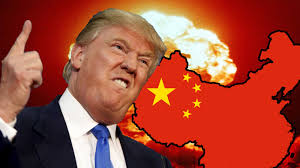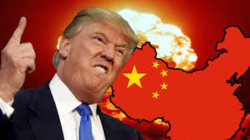The long-term implications of a tough stand against China would be detrimental to U.S. interests even though getting tough on China to placate some of the frustrations of the U.S. electorate would be tempting for president-elect Donald Trump, warned an academic while talking to CNBC.
The deeper, fundamental problems that have hurt lower-middle class American voters would not be addressed by such a move, Eswar Prasad, a professor of trade policy at Cornell University, told CNBC's "Squawk Box". On the contrary, U.S.’s global interest could be harmed as it would only spark retaliatory measures from Beijing.
"Almost certainly we would see an aggressive and strident reaction from China (if Trump were to carry out on his election promises)," said Prasad. "Possibly reducing access to Chinese markets for U.S. businesses and putting a crimp on U.S. companies operating in China."
Trump vowed to impose a 45 percent tariff on Chinese imports and to label China as a currency manipulator, Trump had said on the campaign trail.
There were several ways in Beijing could respond to punitive measures from the U.S., said analysts.
According to HSBC, citing U.S. customs data, tariff on the U.S. service sector, where the U.S. saw a $28 billion trade surplus in 2015 due to education and tourism, could be imposed by China in addition to some or all of its imports from the U.S.
"China could discourage the purchasing of U.S. goods, services and even reject its popular culture (e.g. movies). That would extend the economic pain beyond U.S. exports to U.S. manufacturers and service providers producing and operating elsewhere, too," the HSBC analysts said.
A trade conflict could worsen the foreign exchange demand-supply imbalance in the Chinese domestic market even while it could see a reduction of China's trade surplus with the U.S.
China could let the renminbi weaken substantially as it could be dis-incentivized to defend the currency due to a trade spat, HSBC analysts said. Pushing other Asian and commodity-related currencies lower versus the dollar, this could potentially lead to a currency war.
Investment is another area that would possibly take a hit. "Speculation could rise as to whether China could sell some of its $1.2 trillion holding of U.S. government bonds and roughly $600 billion worth of other U.S. financial instruments," HSBC said, which could trigger global volatility in financial markets.
Even then, China's current trade relation with the U.S. might not meet all of the latter's criteria to call out a country for unfair trade practices.
Three criteria needed to be met before the U.S. could impose "meaningful penalties" on countries that failed to adopt appropriate trade policies according to the U.S. Treasury's rules and regulations, JPMorgan analysts pointed out. These are - persistent interventions to keep its currency weak, a material current account surplus larger than 3 percent of gross domestic product and a significant bilateral trade surplus with the U.S.
China only met the first criteria according to the Treasury's latest assessment report in October.
"Fundamental factors do not support labeling China as a currency manipulator," the JPMorgan analysts said.
Moreover, the U.S. stood to lose more in the long term if it were to disengage substantially from Asia, as Trump's campaign rhetoric has suggested, said Prasad adding that a confrontational stance would hurt both countries in the short term.
"The U.S. is now going to be seen as a less predictable partner in trade (and) financial agreements, which would draw other (Asian) countries close to the embrace of China," he said.
(Source:www.cnbc.com)
The deeper, fundamental problems that have hurt lower-middle class American voters would not be addressed by such a move, Eswar Prasad, a professor of trade policy at Cornell University, told CNBC's "Squawk Box". On the contrary, U.S.’s global interest could be harmed as it would only spark retaliatory measures from Beijing.
"Almost certainly we would see an aggressive and strident reaction from China (if Trump were to carry out on his election promises)," said Prasad. "Possibly reducing access to Chinese markets for U.S. businesses and putting a crimp on U.S. companies operating in China."
Trump vowed to impose a 45 percent tariff on Chinese imports and to label China as a currency manipulator, Trump had said on the campaign trail.
There were several ways in Beijing could respond to punitive measures from the U.S., said analysts.
According to HSBC, citing U.S. customs data, tariff on the U.S. service sector, where the U.S. saw a $28 billion trade surplus in 2015 due to education and tourism, could be imposed by China in addition to some or all of its imports from the U.S.
"China could discourage the purchasing of U.S. goods, services and even reject its popular culture (e.g. movies). That would extend the economic pain beyond U.S. exports to U.S. manufacturers and service providers producing and operating elsewhere, too," the HSBC analysts said.
A trade conflict could worsen the foreign exchange demand-supply imbalance in the Chinese domestic market even while it could see a reduction of China's trade surplus with the U.S.
China could let the renminbi weaken substantially as it could be dis-incentivized to defend the currency due to a trade spat, HSBC analysts said. Pushing other Asian and commodity-related currencies lower versus the dollar, this could potentially lead to a currency war.
Investment is another area that would possibly take a hit. "Speculation could rise as to whether China could sell some of its $1.2 trillion holding of U.S. government bonds and roughly $600 billion worth of other U.S. financial instruments," HSBC said, which could trigger global volatility in financial markets.
Even then, China's current trade relation with the U.S. might not meet all of the latter's criteria to call out a country for unfair trade practices.
Three criteria needed to be met before the U.S. could impose "meaningful penalties" on countries that failed to adopt appropriate trade policies according to the U.S. Treasury's rules and regulations, JPMorgan analysts pointed out. These are - persistent interventions to keep its currency weak, a material current account surplus larger than 3 percent of gross domestic product and a significant bilateral trade surplus with the U.S.
China only met the first criteria according to the Treasury's latest assessment report in October.
"Fundamental factors do not support labeling China as a currency manipulator," the JPMorgan analysts said.
Moreover, the U.S. stood to lose more in the long term if it were to disengage substantially from Asia, as Trump's campaign rhetoric has suggested, said Prasad adding that a confrontational stance would hurt both countries in the short term.
"The U.S. is now going to be seen as a less predictable partner in trade (and) financial agreements, which would draw other (Asian) countries close to the embrace of China," he said.
(Source:www.cnbc.com)















